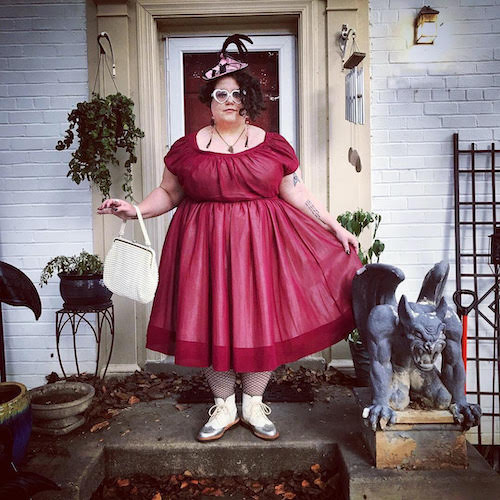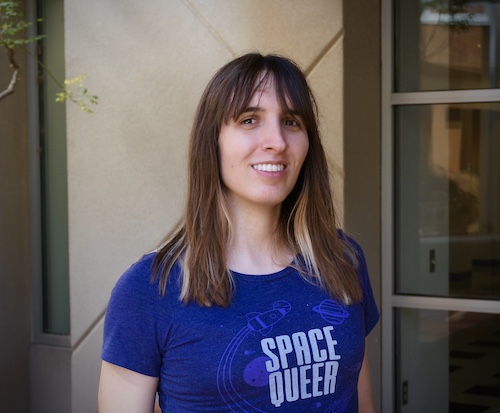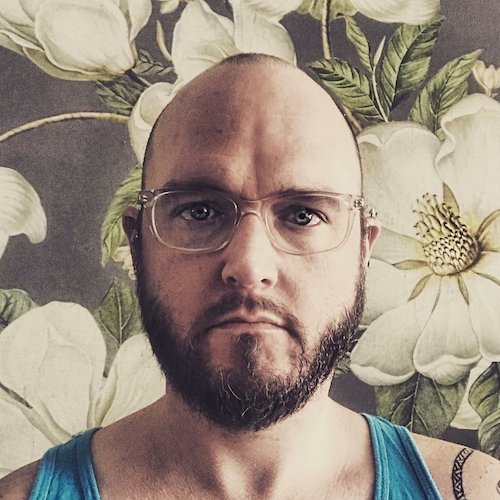Fracture
by Marianne Kirby, Tessa Fisher & dave ring
Edited by Kate Dollarhyde
Copyedited by Chelle Parker
September 2020
1884 words — Reading time: around 9 minutes
Before I was a ship, I was a woman. Before I was a woman, I was a knife.
My edge was born through fracture, polished to sing death into veins and make blood blush upon introduction to brazen air. Before the first cut, nothing. Not simply the absence of memory but a void, vast and fathomless. I cut ruefully — it was never my intention — but still found meaning in the utility of it. Without the violence of motion, I existed inert, buried in my own malaise. What better resting place for a tool of sacrifice than contemplation? But the visions always returned — a cut bringing awareness in flashes of viscera. My sense of self ousted, momentarily obliterated, instead superimposed with the last heartbeats of my victim, as if for a moment I barely existed.
They had paid to die, those who came to me, to save another. A death price. Their resolve was strong. The faces fixed in their memory were so often a child or a lover. At first I tried to condemn them, to ease a growing shame, but my condemnation grew weaker with each death. I held their loved ones in my memory, each one a reminder of my purpose. And yet, despite myself, my malaise grew darker.
I craved movement and feeling. The time we shared shone brief, unless the hand that wielded me cut poorly. And I confess I welcomed it when that happened — the exhilaration of feeling was worth it, even if it meant sharing their agony. See, now, a cut: the last vestiges of life screamed with raw frustration and knowledge. Her thoughts were mine, above all this: If I must die, then at least she will live. We suffered together. Her lifeblood ebbed, the meat of her heart sundered by my blade, but I took solace in knowing that her death would mean something. I bore witness. I savored the face of her loved one, saved the memory as if in amber: a mane of tight curls, dark eyes. Her name fell through my memory like a dying star.
Right after, another cut, but poorly done. I was thrust into this new sacrifice without getting to savor the last. I felt pain, yes, but also fury. My own fury. Something was terribly wrong: I knew the name of this sacrifice. Because in that moment, it was also my name. A name that could have been a sun. It was her, who should have been spared. The vision faded without death’s kiss. No cold realization of her mortality or another vision of her sacrifice.
I waited. I thought perhaps she might take hold of me again. Though it shamed me, I almost hoped that I might become her murderer and know the satisfaction of this perversion put to an end. How else would I know what happened next?
But though I daydreamed of her revenge in a place of hope instead of sorrow, I was still a knife. My hope was poor currency, though it was nearly all I had. And yet, there, beneath my hope, there gleamed a slim intention. That when the next cut came, whether it be of this lover or another, perhaps I could beg a boon. Once, perhaps, I would have begged to be broken. But now, the only thing I want is for someone to let me in.
Is it strange that I never thought to beg for forgiveness?
The first time I woke up as a woman, I could barely move — not due to any physical limitation or injury, but for the sheer sensation of being alive. Of the blood rushing through my veins, the pulsing in my chest, the flesh that wobbled and shook and wrinkled, and the skin that seemed to line the entirety of the world. My consciousness was not used to such a rich spectrum of experience, and I had to lie there beneath the stars for what seemed like forever, feeling everything as the air ebbed and flowed out of my lungs. I marked your name amidst the pinpricks of the night sky.
I discovered all too soon the aching demands that come with a body — hunger, thirst, sleep, and other cravings that can only be temporarily satiated. And I discovered that in this world, such things are rarely freely given. I would have to earn my stay in mortality, it seemed.
Womanhood brought danger. Men and otherwise who took without asking. The corruptions of wealth, the poisons of supremacy.
So I became a dancer. This may seem odd at first, but who better to be a dancer than one who formerly balanced everything on a single cutting blade? I danced at the taverns and the bars and the brothels and even at the houses of the wealthy. I twisted and teased, gyrated and carressed, attuned to the rhythm of the song or simply the beat of my own heart.
I was courted and coveted by men and women alike for my beauty and my grace. It was not long before the powerful sought me out, another treasure to be stolen away, another prize to be won.
But I still remembered the lessons of the knife, and I still knew what those who dream themselves our betters do when they think no one’s watching. I was still subject to them, as well; no longer as a tool but a witness — or even a target.
They thought of me as a serrated toy. They didn’t realize I still remembered how to kill.
Not with a blade, no — never that, never again. Those days are behind me. Life is fragile, however, and there are countless ways to disrupt it, empty it out of whatever vessels it resides in. I knew better now — I knew what it felt like to be hurt, to be terrified beyond reason, to be violated, to wonder if this breath would be my last. I knew that those who enacted such crimes against others did so because it allowed them to pretend that they were somehow beyond the reach of life and death.
They weren’t. They never are. I danced, and I showed these would-be emperors of the world that they are like all the others. I was careful, of course. The mysterious end of a merchant, the disappearance of slave-dealer, the untimely demise of a predator — they were never traced back to me.
Nonetheless, however, suspicions began to arise. And so I traveled, touring my dancing. In every city I went to, I was greeted by admirers, adoring fans, even those who had heard of my reputation in advance and were simply curious. And I was greeted by the rich and powerful.
Another place, another show, another fool who dreams themselves immortal and untouchable, another reminder for the world that no one is safe from mortality. From one edge of the map to the other, I made my bloody pilgrimage. I used your constellation as my compass.
And so my dance went on, my heart beating while their beat ended.
But to what end are these noble deaths when yet another atrocity arises to replace the last? Even as my vault of names grows swollen with purpose. What then holds me to the earth when I could be falling through space? What if there were more and we had only to get there?
When I was a knife, I knew the calculus of taking a life; I tallied every gasp and shudder. When I was a woman, I fancied myself a grand mathematician and believed I could balance the equation. There is always more.
Now I am a ship, and what does a ship need with justice? I will tell you what righteousness is: the vacuum, the void, the endless reach. The distance between stars is a voyage absent morality just as it is absent the soothing gravity of home.
Whether I was a woman or a knife, I was a tool, and — with my cargo of humans hopeful for the new — a tool I remain. I chant these things to myself in the long silence, the deep sleep of our journey. I have stretched all of my sensors out and out and out, further than the engineers who designed this body would believe.
#include <stdio.h>
int main()
{
// printf() displays the string inside quotation
printf("Hello, Galaxy!");
return 0;
}
Hello, Galaxy!
There is an edge and we are coming to it. There is an edge, and we are coming to the furthest reaches of it, and I will not be turned aside. Explore, they told me. Find us a home, they told me. Be our implement, our contrivance, our machine; better if they had told me to be their hands. I am accustomed to being a tool at the direction of others, even when I think I am free: for sacrifice, for the perceived moral victory. And thus I am well-suited to being their ship.
There is no malice left in me. That burned out, a calamitous fire: the kindling laid before the blade, the spark struck by my fervent dance. But better, I repeat in endless sequence to the dust that rushes alongside in infinite expansion until we lose the bounds between us, better had they told me to be their hands so that I might cradle them, might—
#include <stdio.h>
#include <stdlib.h> /* For exit() function */
int main()
{
char sentence[1000];
FILE *fptr;
fptr = fopen("program.txt", "w");
if(fptr == NULL)
{
printf("Error!");
exit(1);
}
printf("Enter a sentence:\n");
gets(sentence);
fprintf(fptr,"%s", sentence);
fclose(fptr);
return 0;
}
Enter a sentence:
I am lonesome without you, my passengers (my poppets), without your wakefulness and waking dreams. A ship is not a name, not a heartbeat, is only a vision of what might come, where we might land.
The fires have all gone out inside me; I am carbon and silicon, base elements carrying life beyond imagination, carrying the record of all the things I might have been, that I might have not been. Perhaps it is all a wrong call, an incorrectly accessed file. Who was I to bargain for a lover, anyone’s lover? Who was I to guide a woman named after a star? Who am I to navigate now?
Have I been patient enough through all of these lifetimes yet?
#include <stdio.h>
#include <stdlib.h> // For exit() function
int main()
{
char c[1000];
FILE *fptr;
if ((fptr = fopen("program.txt", "r")) == NULL)
{
printf("Error! opening file");
// Program exits if file pointer returns NULL.
exit(1);
}
// reads text until newline
fscanf(fptr,"%[^\n]", c);
printf("Data from the file:\n%s", c);
fclose(fptr);
return 0;
}
Data from the file: Please, give me hands that I might touch you. Please, stay where I can see you hear you know your name. I am a blade. I am a woman. I am a ship. I am too much alone.
Forgive me. If that is what it takes, forgive me. There is the emptiness, finally; the edge of relief welcomes me with the promise of no more lives or maybe another knife. I do not know. I only know that I want the release of it. Accept this knife, this woman, this ship — and all that I bring with me into the still calmness of the void.
Null. Null. Null.


